ASUS Transformer Book T100 Review: Redefining the Entry-Level Windows Notebook
by Anand Lal Shimpi on October 18, 2013 12:00 AM ESTCPU Performance
The Atom Z3740 in the T100 features a 9% lower base clock and 22.5% lower max turbo frequency than the Z3770 we previewed back at IDF. Given how good of a job Bay Trail does turboing up to max frequencies under normal use, I’d expect proportionally lower scores in our tests.
I’ll start with our cross platform browser based benchmarks before moving on to a look at the Z3740 vs. Z3770.
Note for all of these benchmarks I’ve used Google’s Chrome browser. IE11 integrates well into the modern UI of Windows 8.1 but is otherwise a pretty terrible browser by comparison. I think the modern UI Chrome experience on 8.1 isn’t as good, but it’s a better/faster/less-finicky option. Out of all of our tests only SunSpider seems to run quicker under IE11, whereas Chrome wins everywhere else. I think it’s a bit insane to switch between browsers based on the benchmark being run, so we’re sticking with Chrome across the board.
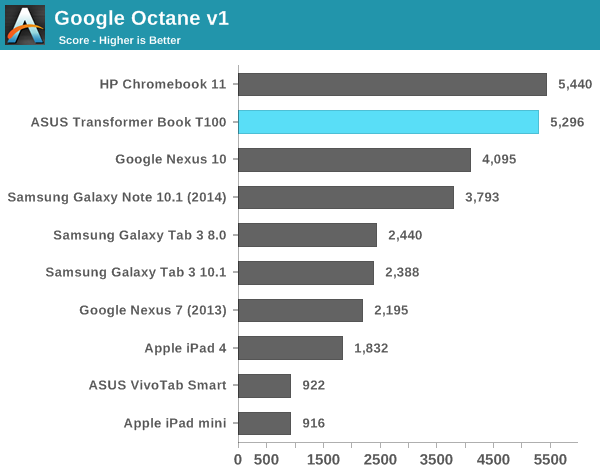
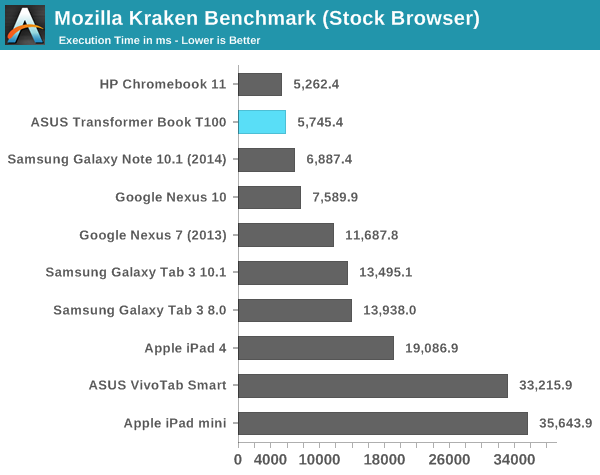
Lightly threaded performance is actually quite comparable to the Chromebook 11, which was a bit surprising. Throw a multitasking workload at the two notebooks and you'll separate the boys from the men though:
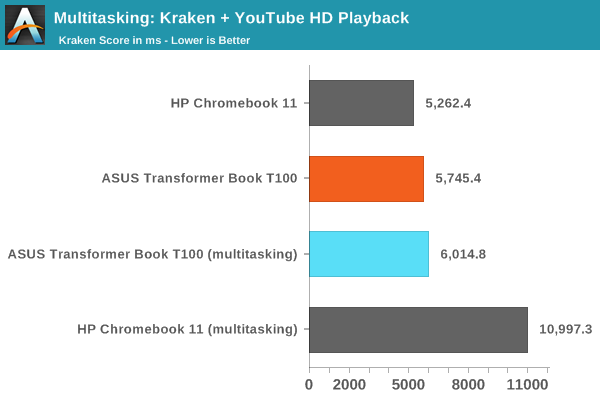
Chrome under Chrome OS performs extremely well for obvious reasons. But here the T100's additional cores and solid memory interface really come in handy when multitasking, there's hardly any performance penalty for this sort of multitasking on Bay Trail while the dual-core Cortex A15 based Chromebook needs serious help.
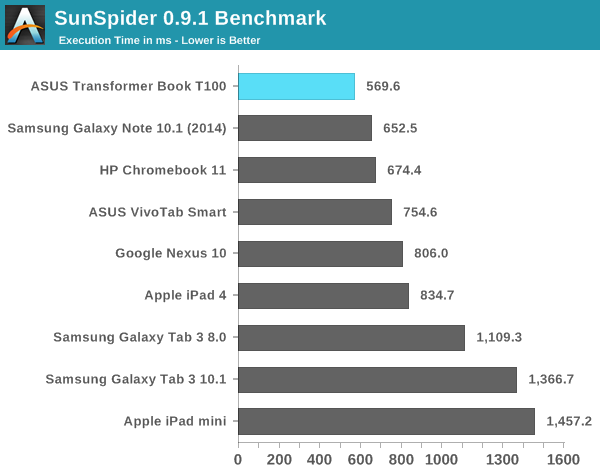
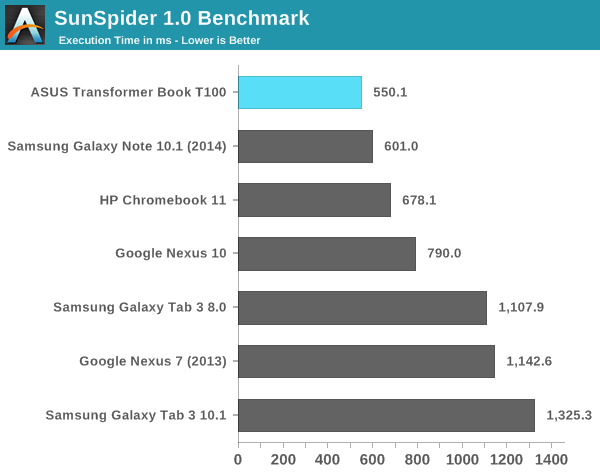
The T100 remains extremely competitive compared to the Chromebook 11 and definitely compared to Android tablets.
Next up is putting the Atom Z3740's performance in perspective compared to our earlier FFRD data:
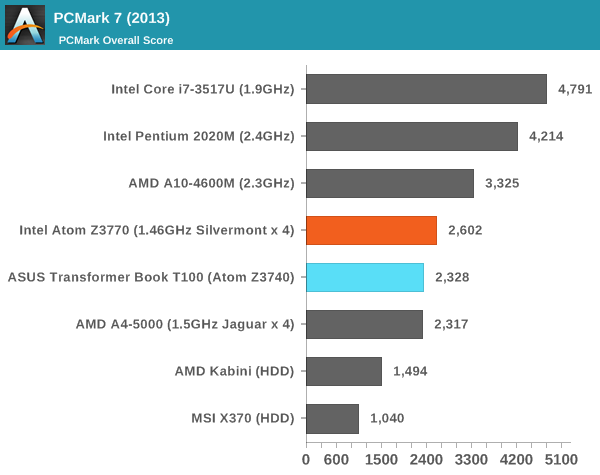
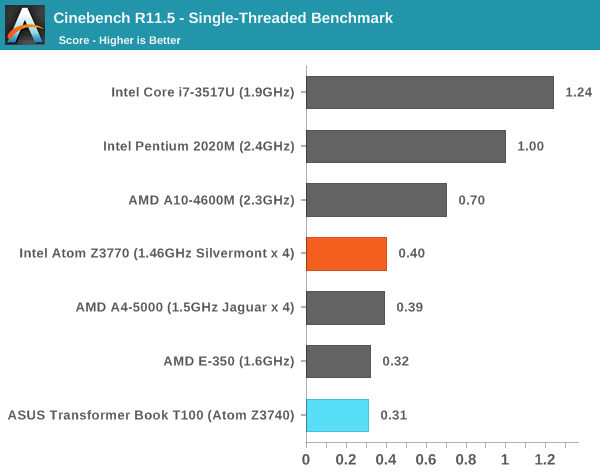
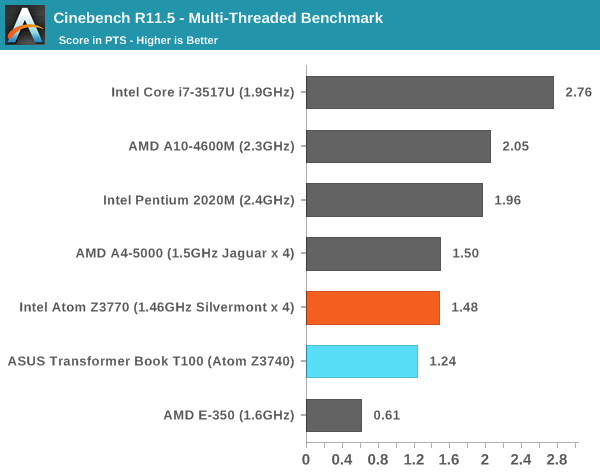
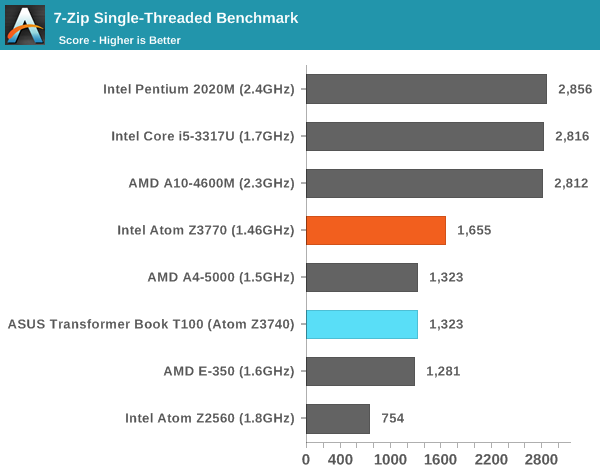
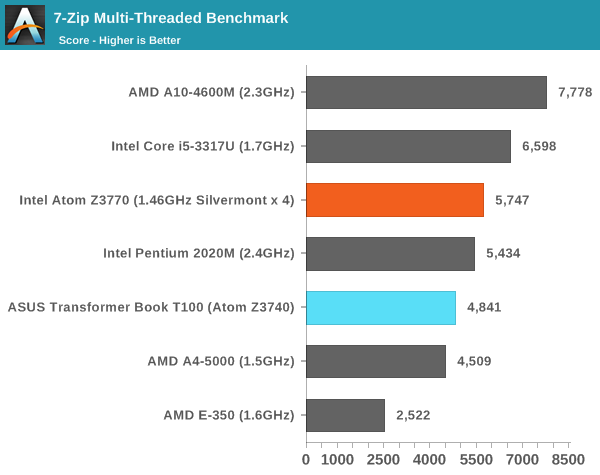
In all of these tests we see nearly perfect scaling compared to the Atom Z3770. Turbo frequencies are regularly hit when under load, and as a result see see proportionally lower performance from the T100. I would’ve liked to have seen the Z3770 used in the T100, but not if it meant a higher price, an optional dock or a worse display.
GPU Performance
I didn’t have a ton of time to go through gaming performance on the T100, but with a quarter of the EUs of Ivy Bridge it’s clear that you shouldn’t expect a GPU monster out of Bay Trail. In our cross platform graphics tests however the T100 is quite competitive, although not industry leading by any means.
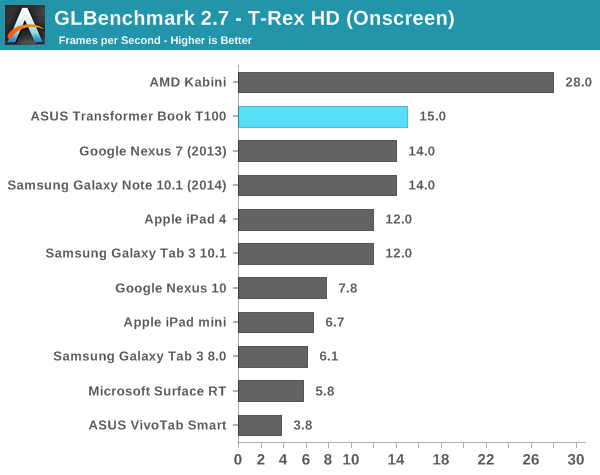
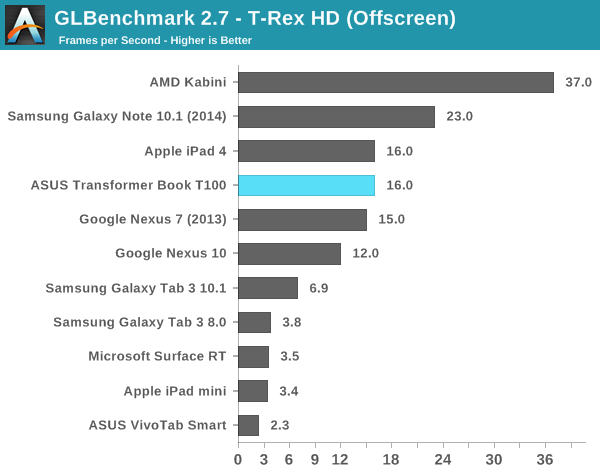
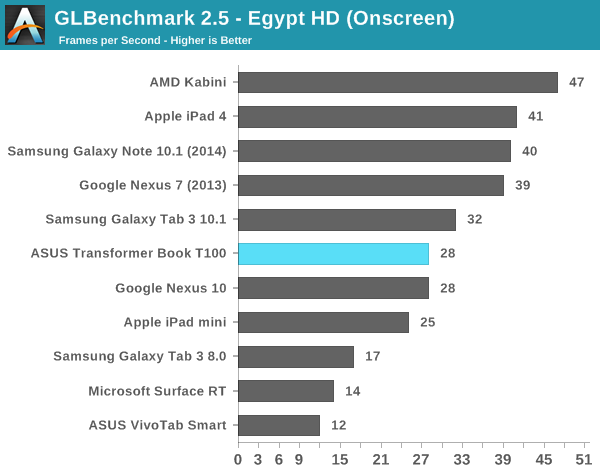
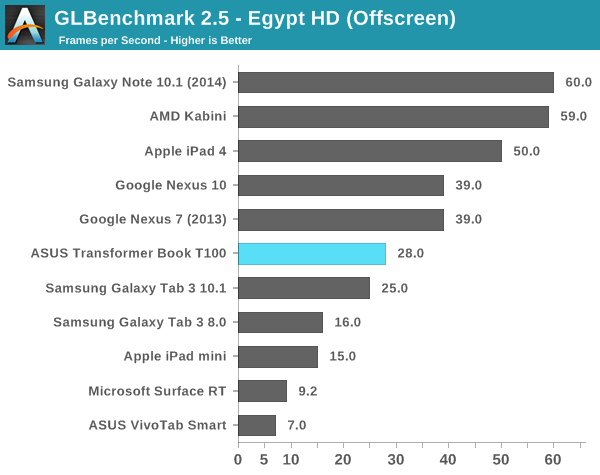
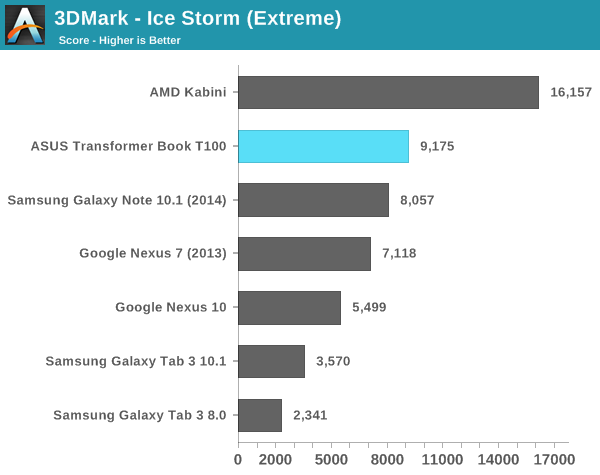
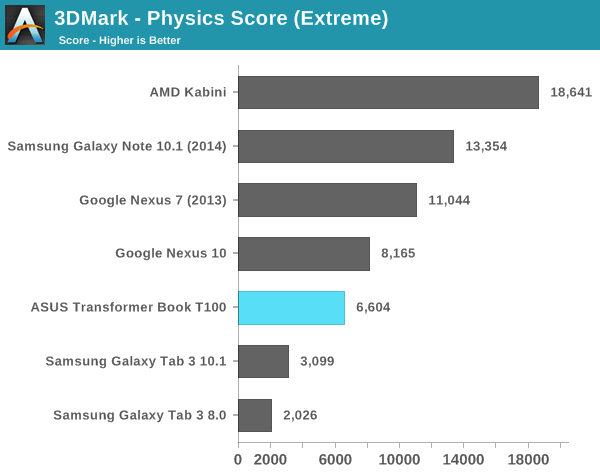
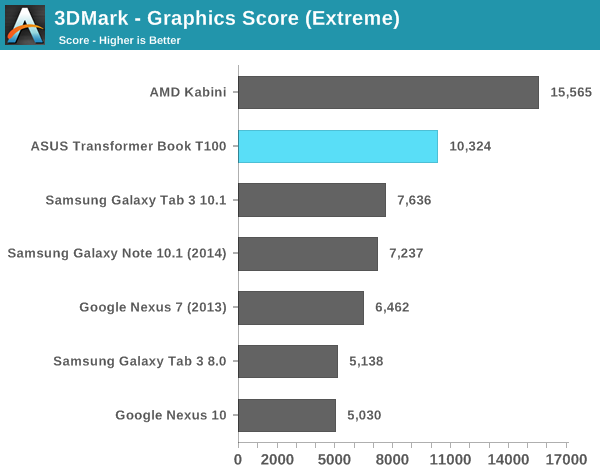
I did see some choppy animations at times and indications that the GPU (or its drivers) weren’t up to snuff, but that’s exclusively in classic desktop mode. In the modern UI, the Atom Z3740 was very smooth.
Storage Performance
Our Android IO tests rely on Androbench with a relatively limited LBA span. I increased the difficulty of the test a bit under Windows 8.1 but still kept it reasonable since we are dealing with eMMC solutions. I’m testing across a 1GB LBA span and testing for a period of 1 minute, which is an ok balance between difficulty of workload and sensitivity to the fact that we’re evaluating low-class SSDs here.
Sequential read and write performance is competitive with the high-end examples we’ve seen in the Android space. Random read performance is similarly good, while random write performance is appreciably better than what we’re used to in Android tablets. It is good to see ASUS/Intel/Microsoft concerned about random write performance, but I’d still like to see a 5 - 10x increase in these numbers with a focus on sustained performance before I’m truly happy.
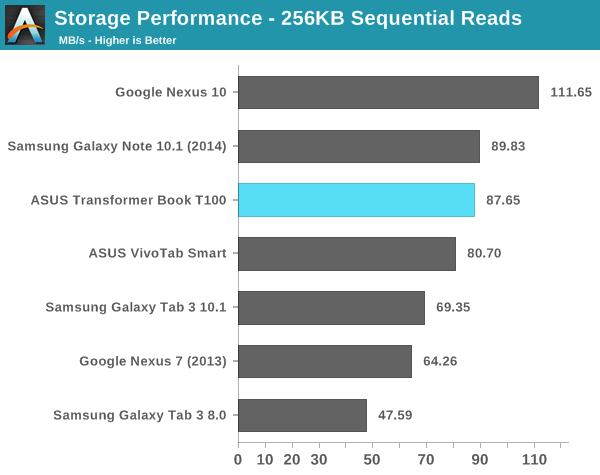
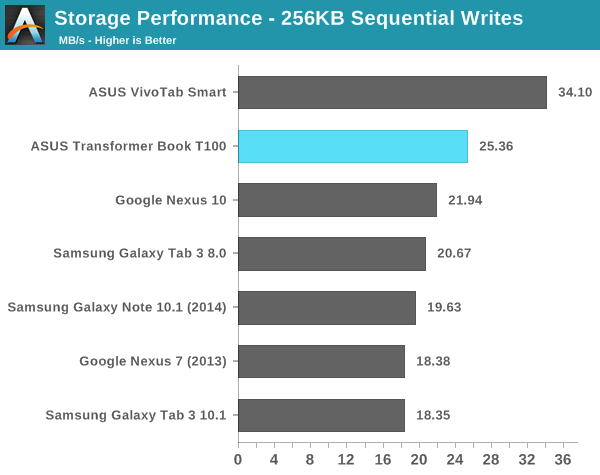
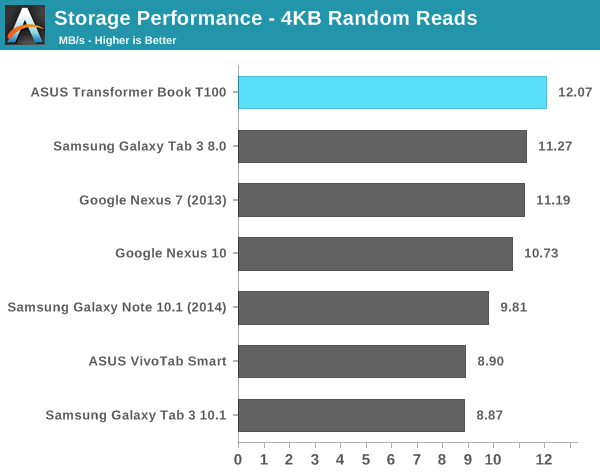
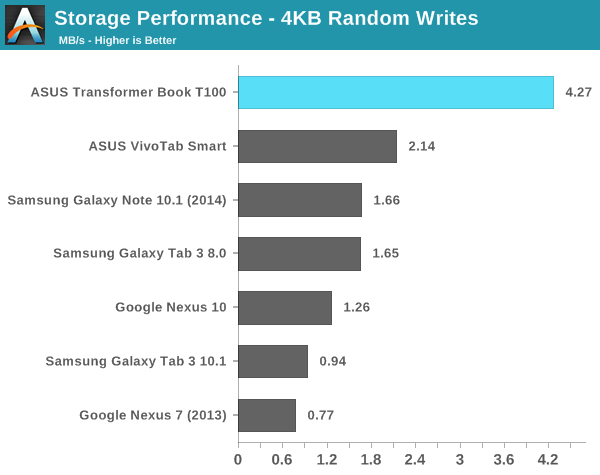










158 Comments
View All Comments
trane - Friday, October 18, 2013 - link
Great review, but I am not sure if the approach is correct. This is clearly targeted at people with small budgets, people who have $300-$400 to spend on a single computing device. This is a truly amazing value for money. Honestly, the targeted crowd aren't concerned that Delta-E is not under 6 as much as getting Windows and Office and a 8+ hour battery life for just $350!Yes, the Dell Venue Pro 11 promises to be much better, but it is also more expensive. I'm looking forward to Asus making a similarly high-end Bay Trail Windows 8.1 tablet. There's no going back to Android/iOS once I got acclimatised to Metro.
yauchildchew - Friday, October 18, 2013 - link
can upgrade ram?? diy.sri_tech - Friday, October 18, 2013 - link
I am disappointed that in the Anand's review for first time.He always bringing up chromebook 11 which has shitty performance even when browsing and terrible battery life.
I still don't understand what is great about iOS and android for tablets other than missing apps.
Windows 8 is better in every way for tablets than iOS and android.
erikiksaz - Friday, October 18, 2013 - link
I currently use a surface pro, used to have a nexus 10, and gf has an ipad.Benefits of iOS/android tablets:
1) Hit the power button, and they're on, ready to go in an instant because they were idling. Not so on laptops, it'll take at least a couple (more like few to several) seconds for the system to wake, reconnect to the network.
2) Smoothness. Unless you run IE (which is ipad-smooth, but unfortunately IE kinda sucks), chrome does not move nearly as smooth as it does on iOS and to a lesser degree android.
3) Until haswell and it's lesser forms were released, battery life. Now it's not so much of an issue.
4) Missing apps may not be a dealbreaker for you, but the lack of popular tablet games is a huge deal breaker for those who use their devices only for the consumption of media.
5) Text and menu scaling is broken on Windows. 8.1 still doesn't fix chrome's teeny weeny little menus. I've got relatively smaller hands, so if I'm having problems, your average 6ft6in Caucasian male with sausage fingers will definitely not be happy targeting buttons that are 3-4mm across.
jasonelmore - Friday, October 18, 2013 - link
seriously, what non Apple iOS app cant be replaced by the millions of apps on x86 windows? sorry you cant use the app argument. the whole reason apple made apps was to get around the fact that they weren't x86steven75 - Friday, October 18, 2013 - link
Is that a serious questions? Pretty much every touch-based tablet app...Windows is still by FAR a mouse & keyboard OS first. I don't use my tablet sitting at a table. In fact I often use it ways that not even a normal laptop is comfortable such as laying down.
shibs - Friday, October 18, 2013 - link
Hit power button and you are ready to go in Win tablets too.. unless you have shutdown, which is the same case for android/iOs..steven75 - Friday, October 18, 2013 - link
If I sleep a windows laptop it will run down the battery in 24 hours whereas any true tablet will stay in that state for weeks.wsw1982 - Friday, October 18, 2013 - link
Are your sure? Even my 15" power horse thinkpad W520 could standby for a week....hybrid2d4x4 - Saturday, October 19, 2013 - link
uh.. what? My sandy bridge Acer 3830TG can sleep (S3, not hibernate) for over 3 weeks. An Asus TF300 android tablet I had could only sleep for 5-7 days, and it had the equivalent of "connected standby" disabled (same as the laptop).